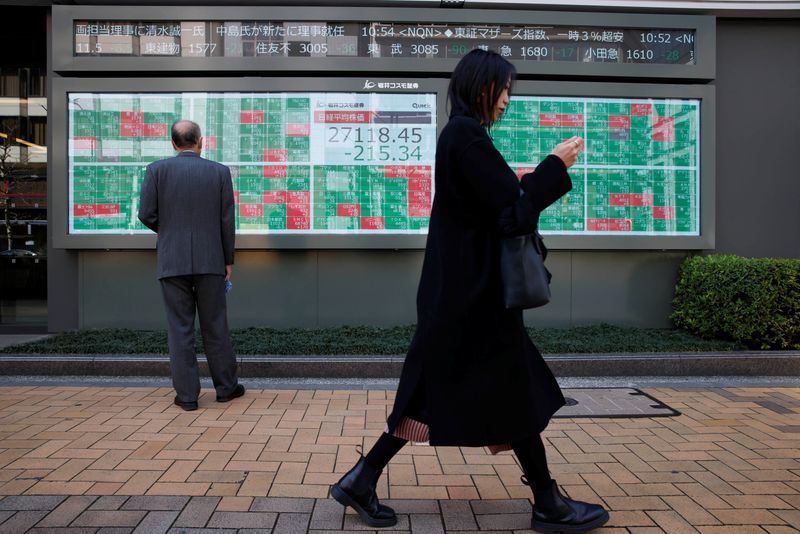By Rae Wee and Ankur Banerjee
SINGAPORE (Reuters) - Japanese stocks have made a blazing start to 2024, surging to three-decade highs as a weaker yen and expectations of interest rates staying low have re-ignited the strongest rally for years.
A 6% gain in the Nikkei over the past two weeks is the best start to the year in a generation, according to LSEG data, and comes on the heels of a 28% jump last year --- the biggest annual gain in 10 years.
As chart levels break, dealers say hedge funds are rushing to chase the momentum and that the index's 1989 peak of 38,957 is in sight as more cash from home and abroad flows in.
Foreigners were net sellers in the first week of January, if derivative trade is taken into account, but were buyers of cash equities according to exchange data and sales desks say this week was even busier and that sellers have been scarce.
Last year drew 6.3 trillion yen ($43.5 billion) worth of net equity buying from foreigners, the largest in data stretching back a decade.
"Since the start of the year we see nine times more volume than December," said Tareck Horchani, head of prime brokerage dealing at Maybank Securities in Singapore, with buying heavy in the technology sector.
"This flow is coming from long-short equity funds ... global investors who were hesitant to buy Japan in last quarter of 2023 now have more conviction to invest," he said.
The attraction is a domestic economy emerging from decades of deflation, an export sector supported by a weak yen and an expectation - strengthened by a deadly earthquake off the west coast in January - that monetary policy will stay supportive.
Core inflation seems to be settling in just above 2% and the Bank of Japan has given no indication of being in a hurry to arrest it - keeping the yen cheap by historical standards and traders expecting rates to stay negative until at least April.
That setup, Nomura analysts noted, has deterred selling - in contrast with world markets which have dipped 0.5% so far this year.
"The absence of sellers in the market may continue to support strong share prices for the time being," they said.
"We think the Nikkei 225's rise is unlikely to stop even at 35,000. Our forecast range for January–March is 33,000–37,000."
Kenji Abe, a strategist at Daiwa Securities, said his year-end forecast is 40,000. The index closed at 35,577 on Friday. (T)
STRENGTH TO STRENGTH
Investors also feel a shift in market leadership over the past few months is breathing new life into the rally.
In 2023, many foreign money managers said that a push by the Tokyo Stock Exchange to improve corporate governance and tighten up Japan Inc's notoriously flabby balance sheets drove stock buybacks, cross-holding sales, price gains and investment.
Now, however, the precision-instrument sector, comprising "hidden jewel" companies making semiconductors or software, is gaining fastest, said Richard Kaye, Japan-based portfolio manager at asset manager Comgest.
He said large foreign investors, who brokers estimate remain under-exposed to market that had disappointed for many years, are taking note.
"We have six large long institutions looking at our fund right now, if that's representative of who's buying what and why."
In a presentation this week, portfolio managers at Santa Fe-based Thornburg Investment Management listed chipmaking-equipment builder Disco (OTC:DSCSY) Corp among companies offering exposure to the "picks and shovels" of the AI gold rush.
Its stock price has doubled since May 2023.
To be sure, the speed and scale of recent gains invites reversal and technical indicators are flashing warning signs. Nikkei volatility has spiked and the relative strength index hit 73.63, with readings above 70 suggesting overheating.
Thornburg's Brian Burrell also said that a rise in the yen and rotation out of exporters' stocks present risks.
But there are signs the gains are durable.
Bank of America noted a weakening yen and anticipation of wage increases mirrored the backdrop to a rally that lifted the Nikkei almost 20% between April and June last year and said overhauled tax breaks could spur buying by domestic investors.

"Strength begets strength," said Pepperstone analyst Chris Weston. "Find a market that's strong and massage your entry points."
($1 = 145.0100 yen)